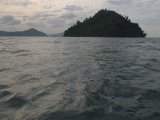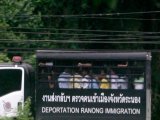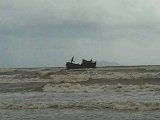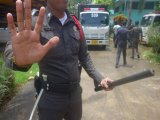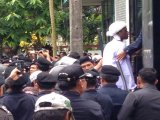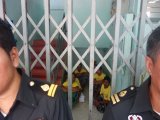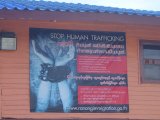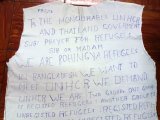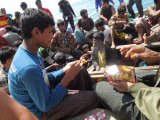WHEN PEOPLE in your organisation are accused of involvement in the slave trade, you must investigate these claims. If you find the culprits, punish them severely, then set up measures to stop future criminal acts.
In short, clean up your organisation. That's how you restore your reputation.
To its detriment, the Royal Thai Navy does not believe in this straightforward remedy.
Instead of launching internal investigations to find the culprits when a news report implicated naval officers in the trade of Rohingya boat people as slaves, the navy chose to shoot the messengers.
Earlier this week, the navy slapped two journalists of Phuketwan - a news website in Phuket - with a defamation lawsuit. Under the Computer Crimes Act, which carries a heavier punishment than regular defamation law, journalists Alan Morison and Chutima Silasathian face a maximum jail term of five years and/or a fine up to 100,000 baht if they are found guilty.
This is scandalous, to say the least.
Phuketwan has won wide recognition for its dedication to exposing the trade in Rohingya slaves. Obviously, it has ruffled feathers in many quarters.
But Phuketwan was not the news agency that had caused the navy's ire. In July, Reuters ran a special report featuring disturbing accounts of torture endured by Rohingya victims while being sold from one group of human traffickers to another.
Along the way, some died of hunger and illness. Others who tried to escape were severely beaten, or killed. Their stories exposed the involvement of local officials, ranging from the police, to immigration officials, to the navy. The Reuters story was run by news organisations worldwide. Phuketwan was just one of many.
But of these organisations, Phuketwan is the most consistent in exposing the plight of the Rohingya boat people. Silencing Phuketwan, therefore, would mean cutting an important link in the chain of information that exposes the crimes of human traffickers.
The navy's defamation lawsuit also raises questions of whether the government is sending a stern message to international news agencies. Thailand is facing trade sanction threats from the European Union for using slave labour on fishing boats. Trade sanctions are also in store if the US State Department downgrades Thailand to Tier 3, the lowest rank in its Trafficking in Persons report next June. Successive negative international reports would not help Thailand's case.
In August, Britain's Channel 4 exposed how islands in the Andaman Sea were used to imprison Rohingya before they were sold as slaves, by traffickers who used officials as accomplices.
Earlier this month, a Reuters report investigated the sudden the disappearances of Rohingyas who had been detained at immigration centers. Their stories were the same. They were told by immigration officials that they were going home. Then they were taken aboard a boat, and sold to slave traders at sea.
The UN and the US promptly pushed the government to investigate the Reuters report. Prime Minister Yingluck Shinawatra agreed that she would. Then, the navy slapped Phuketwan with a defamation lawsuit. There were reports that Reuters reporters might face prosecution too.
Slavery is a crime against humanity. To clear the country's human trafficking record, the government must arrest traffickers and punish corrupt officials. And stop muzzling the press. The navy must drop defamation lawsuits against journalists that expose the truth.
Republished by permission from the Bangkok Post, December 20, 2013
In short, clean up your organisation. That's how you restore your reputation.
To its detriment, the Royal Thai Navy does not believe in this straightforward remedy.
Instead of launching internal investigations to find the culprits when a news report implicated naval officers in the trade of Rohingya boat people as slaves, the navy chose to shoot the messengers.
Earlier this week, the navy slapped two journalists of Phuketwan - a news website in Phuket - with a defamation lawsuit. Under the Computer Crimes Act, which carries a heavier punishment than regular defamation law, journalists Alan Morison and Chutima Silasathian face a maximum jail term of five years and/or a fine up to 100,000 baht if they are found guilty.
This is scandalous, to say the least.
Phuketwan has won wide recognition for its dedication to exposing the trade in Rohingya slaves. Obviously, it has ruffled feathers in many quarters.
But Phuketwan was not the news agency that had caused the navy's ire. In July, Reuters ran a special report featuring disturbing accounts of torture endured by Rohingya victims while being sold from one group of human traffickers to another.
Along the way, some died of hunger and illness. Others who tried to escape were severely beaten, or killed. Their stories exposed the involvement of local officials, ranging from the police, to immigration officials, to the navy. The Reuters story was run by news organisations worldwide. Phuketwan was just one of many.
But of these organisations, Phuketwan is the most consistent in exposing the plight of the Rohingya boat people. Silencing Phuketwan, therefore, would mean cutting an important link in the chain of information that exposes the crimes of human traffickers.
The navy's defamation lawsuit also raises questions of whether the government is sending a stern message to international news agencies. Thailand is facing trade sanction threats from the European Union for using slave labour on fishing boats. Trade sanctions are also in store if the US State Department downgrades Thailand to Tier 3, the lowest rank in its Trafficking in Persons report next June. Successive negative international reports would not help Thailand's case.
In August, Britain's Channel 4 exposed how islands in the Andaman Sea were used to imprison Rohingya before they were sold as slaves, by traffickers who used officials as accomplices.
Earlier this month, a Reuters report investigated the sudden the disappearances of Rohingyas who had been detained at immigration centers. Their stories were the same. They were told by immigration officials that they were going home. Then they were taken aboard a boat, and sold to slave traders at sea.
The UN and the US promptly pushed the government to investigate the Reuters report. Prime Minister Yingluck Shinawatra agreed that she would. Then, the navy slapped Phuketwan with a defamation lawsuit. There were reports that Reuters reporters might face prosecution too.
Slavery is a crime against humanity. To clear the country's human trafficking record, the government must arrest traffickers and punish corrupt officials. And stop muzzling the press. The navy must drop defamation lawsuits against journalists that expose the truth.
Republished by permission from the Bangkok Post, December 20, 2013













